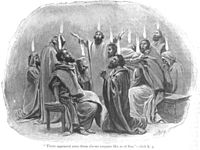Montanism

Montanism was a religious movement that started in the 2nd century AD. It was named after a man named Montanus who claimed to be a prophet and said that he could speak for God.
Montanus said that he had been chosen by God to deliver a new message to the people of his time. He believed that the end of the world was near and that the Holy Spirit was speaking through him to prepare people for the coming of Christ.
Montanism quickly became popular in some parts of the Christian world, but it was also controversial. Some people believed that Montanus was a false prophet and that his teachings were not in line with the teachings of Jesus and the Bible.
One of the key beliefs of Montanism was the idea that the Holy Spirit was speaking through the prophets and that their words were just as important as the words of Jesus himself. This was seen as a departure from traditional Christian doctrine, which held that the Bible and the teachings of Jesus were the only reliable sources of spiritual guidance.
Another controversial aspect of Montanism was the emphasis on ecstatic experiences and prophetic visions. Montanus and his followers placed a great deal of importance on experiencing the presence of God in a personal way, and they believed that this was the key to spiritual growth and enlightenment.
Despite its controversial nature, Montanism had a lasting impact on the history of Christianity. It sparked new debates about the role of prophecy and spiritual experiences in the life of the church, and it helped to shape the development of Christian theology in the centuries that followed.
Montanus said that he had been chosen by God to deliver a new message to the people of his time. He believed that the end of the world was near and that the Holy Spirit was speaking through him to prepare people for the coming of Christ.
Montanism quickly became popular in some parts of the Christian world, but it was also controversial. Some people believed that Montanus was a false prophet and that his teachings were not in line with the teachings of Jesus and the Bible.
One of the key beliefs of Montanism was the idea that the Holy Spirit was speaking through the prophets and that their words were just as important as the words of Jesus himself. This was seen as a departure from traditional Christian doctrine, which held that the Bible and the teachings of Jesus were the only reliable sources of spiritual guidance.
Another controversial aspect of Montanism was the emphasis on ecstatic experiences and prophetic visions. Montanus and his followers placed a great deal of importance on experiencing the presence of God in a personal way, and they believed that this was the key to spiritual growth and enlightenment.
Despite its controversial nature, Montanism had a lasting impact on the history of Christianity. It sparked new debates about the role of prophecy and spiritual experiences in the life of the church, and it helped to shape the development of Christian theology in the centuries that followed.
Related topics others have asked about:
